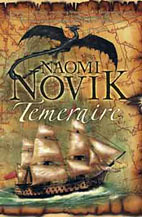Temeraire - Naomi Novik

Dragons in the Napoleonic Wars! Not the most obvious subject for a book, you might think, but Susanna Clarke managed to mix magic and Napoleon quite nicely in Jonathan Strange and Mr Norrell, and Novik succeeds just as well here. This comparison is rather misleading, however, as the books are at quite the opposite ends of the genre spectrum, sharing little more than the setting. Clarke's book is a darkly whimsical doorstop of a novel that has received a lot of attention from the mainstream literati; Novik's is a short, light fantasy adventure with no pretentions of being any more than it is. While all of the main characters are adults, it has the feel of a book for older children - nothing wrong with this at all, and it makes for a quick and entertaining read.
Temeraire opens with a sea battle; Captain Laurence and his crew have just captured a French frigate carrying a precious dragon egg across the Atlantic. Dragons are crucial to the war effort, almost as much as ships, so this great prize is transported back to British waters as quickly as possible to be handed over to the Aerial Corps. Unfortunately for Laurence, the egg hatches en route and the dragon, Temeraire, chooses him as its rider. He is forced to abandon the naval career he loves to join the peculiar community of dragon-riders and take part in the hazardous business of aerial warfare. There isn't actually that much action in the book, as it focuses mostly on Laurence's training, his bond with Temeraire and how he adjusts to his new life, but that doesn't stop it from being a page-turner as the society and the dragonlore is gradually revealed.
The concept of dragons here is the main original idea in the book. They are not psychic, mystical or monstrous, and are treated as just another natural creature that happens to have been domesticated. Much like dogs, each country has developed its own breeds of dragons and a large part of the war effort is devoted to strengthening bloodlines for dragons faster, stronger or more deadly than the enemy's breeds. The hints throughout of the history of dragon breeding are quite intriguing - first domesticated by the Romans, perfected by the secretive Chinese, practiced across the world by Turks and Incas as well as the Europeans - and I'm very glad to hear that more of this will be explored in the sequels. The intelligence of the dragons is not a new idea, but adds a lot to the story and particularly Laurence's relationship with Temeraire.
The book is not groundbreaking, but the fluid pace and able storytelling make it extremely fun to read. Highly recommended if you're not after anything too deep; I for one will certainly be picking up the sequels.
8/10



0 Comments:
Post a Comment
<< Home